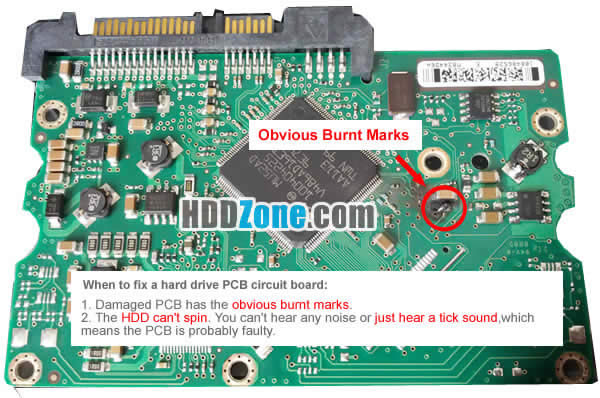Are you experiencing issues with your hard drive? Perhaps you suspect that the printed circuit board (PCB) is damaged. In this article, we will discuss how to identify if your hard drive PCB is damaged and what steps you can take to resolve the issue.

Firstly, it's important to understand what a PCB does. The PCB is a small board that connects the hard drive's internal components to the external connectors. It also controls the power and data flow between the hard drive and the computer. If the PCB is damaged, it can cause a range of issues, including the hard drive not being recognized by the computer or the drive not spinning up.
One of the most common signs of a damaged PCB is a clicking sound coming from the hard drive. This sound indicates that the drive is trying to spin up but is unable to do so. Another possible sign is that the computer recognizes the hard drive but is unable to access its data.
Hard drive pcb failure symptoms:
- HDD can't spin up. Either no sound or a short, quiet tickling sound can be heard.
- A burning smell can be sensed coming from the HDD or PCB.
- Burned components on the PCB.
- The HDD be connected to wrong power supply.
- PCB's interface damaged.
Replace the PCB will not solve these problems:
- The drive will power up normally (no ticking noises, errors etc) but will not be recognized by the computer;
- The drive will power up normally and be recognized correctly but will report a size of 0 bytes;
- The drive will power up but report SMART errors on boot;
Those problems are caused by the hard drive pcb firmware corrupted.
If you suspect that your hard drive PCB is damaged, there are a few steps you can take to confirm this. Firstly, you can try swapping the PCB with one from a similar hard drive. However, this is only recommended if you have experience working with electronics and have access to the proper tools. Alternatively, you can send your hard drive to a professional data recovery service that specializes in PCB repair.
If your hard drive PCB is indeed damaged, it's important to replace it as soon as possible. This is because a damaged PCB can cause further damage to the hard drive's components, making data recovery more difficult or even impossible.
In conclusion, a damaged hard drive PCB can cause a range of issues, including the hard drive not being recognized by the computer or the drive not spinning up. If you suspect that your hard drive PCB is damaged, it's important to confirm this and take appropriate action. Whether you choose to replace the PCB yourself (hard drive pcb replacement) or seek professional help, addressing the issue as soon as possible can increase your chances of successful data recovery.




